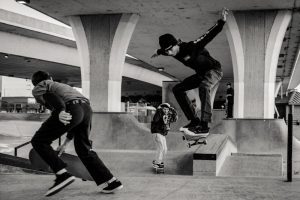Movies and television shows have shown us different versions of skater characters, but most tend to rely on the same stereotypical qualities. Often, you’ll find skateboarders portrayed as dark and mysterious bad boys in grungy clothing, who don’t follow the rules, skip school, and have issues with authority figures.
However, any skater will tell you that these stereotyped characters don’t fully represent the diverse skating community in the real world. Let’s take a look at five of the most common misconceptions about skaters to help give you a better understanding of skateboarding culture. In reality, there’s a place for anyone who loves to skate.

(Brett Sayles/pexels)
1. Skateboarding Is for Boys
This stereotype couldn’t be further from the truth. There are tons of talented ladies who are killing it at the X Games, the Olympics, and at local skateparks across the world. Many of the pioneers of skateboarding culture in the 1960s and 1970s were actually women who were breaking down the barriers for girls and women in sports.
In addition, skater style going more mainstream has a lot to do with women in the sport. Women are instrumental in pushing fashion styles and trends forward. Baggy skater girl outfits and other girls’ skate apparel can be seen on runways, streets, and in classrooms. The popularity of skateboarding fashion has also brought more people to pick up skating.
So, whoever told you that skateboarding is only for boys clearly hasn’t been looking around enough.
2. Skaters Skip School
Contrary to what Hollywood may have told you, wanting to be a skateboarder does not mean never sitting at a desk again. Tons of skaters do really well in school, and many of the skills you pick up while skateboarding can actually help improve school and job performance.
Skateboarding teaches skills like overcoming difficulties, discipline, and hard work. These skills easily transfer to the classroom. The ability to push through difficult units or to complete assignments on time are all traits that can be picked up or re-enforced while skateboarding.
3. Skateboarding Leads to Delinquency
Just because someone skateboards does not mean that they are headed for a life of delinquency. Many professional skateboarders are advocates for living a clean lifestyle and breaking down the stigmas surrounding the sport.
Additionally, you may have seen images of skate parks full of inappropriate graffiti and illegal street art. While learning to express yourself is valued in skateboarding culture, many skaters choose to do that through clothes and on our boards.
Skate parks are a special place. They are a safe space for many different people, and some spend a great deal of their time at the park. Keeping places clean and safe for everyone is important to skaters, and those people who ruin it are often unwelcome.
If you are worried about yourself or your child being peer pressured into partaking in things you don’t agree with, just know that the skateboarding community is all about standing up for what you believe in. People who may push you into doing things you oppose aren’t real skaters, they are bullies who happen to ride skateboards.
4. People Who Skateboard Are Anti-Social
One of the best parts about skateboarding is finding community with fellow skaters. So, no! Skaters aren’t anti-social outcasts. When skateboarding began it was started within a community of surfers who were looking to connect off of the waves. As the sport rose in popularity it brought in tons of non-surfers looking to be part of the action as well as the community.
A massive part of skateboarding is making friends and helping out your fellow skaters. While everyone’s interests off the board may differ, skateboarding unites people from all different backgrounds.
5. Skateboarding Style Is Too Alternative
While there are totally skaters out there who are rocking some more alternative fits, skateboarding provides a lot of room (literally) for fashion variation. Baggy skater clothes are a defining part of skating style, but baggy pieces can be paired to match tons of different vibes and fits.
Skater style has evolved over the decades and has been influenced by all the different fashion trends. The reverse is also true: popular fashion has pulled influence from skateboard culture.
If you look up “youth skate clothing” or “baggy skater outfit” on any website or social media page, you will see a wide range of styles. Skating is about embracing what makes you special and unique, and a lot of that is done through clothing choices. Skaters don’t all dress the same because skaters aren’t all the same.
Skater culture is so much more than what you may think based on stereotypes and depictions. The community and culture welcomes people from all walks of life, careers, ages, and genders. At its best, it is a safe place for people to express themselves through style and movement.
